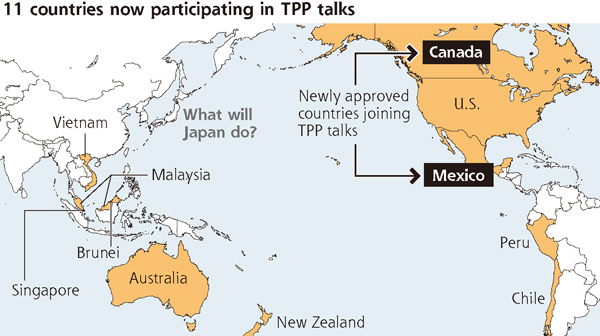Noda to express willingness to participate in TPP talks

THE ASAHI SHIMBUN | November 09, 2012
Noda to express willingness to participate in TPP talks
With U.S. President Barack Obama winning re-election, Prime Minister Yoshihiko Noda plans to express his intention to have Japan join in negotiations for the Trans-Pacific Partnership free trade agreement, which will strengthen ties with the United States.
The Obama administration has been a strong proponent of the TPP, and although Noda indicated a year ago that Japan would begin discussions with relevant nations to prepare for joining the TPP talks, strong resistance within the ruling Democratic Party of Japan had forced the prime minister to stop short of actually declaring that Japan would join the talks.
In particular, many DPJ lawmakers have been concerned about the possible devastating effects joining the TPP could have on Japanese agriculture.
However, sources said Noda was moving forward on the issue in an attempt to strengthen Japan’s military alliance with the United States. Such a need has increased in recent months due to the harsh confrontation with China over the Senkaku Islands.
Some government officials have indicated that Noda would even use the TPP issue in a Lower House election against the opposition Liberal Democratic Party, which has taken a more passive stance on joining the TPP talks.
However, the move on the TPP could come back to haunt Noda if it leads to greater defections from the ruling party. A loss of six Lower House members would mean the ruling coalition no longer controls a majority in that chamber, which could lead to the passage of a no-confidence motion against the Noda Cabinet.
A number of Cabinet ministers have come out in favor of joining the TPP talks.
On Nov. 9, Yukio Edano, the economy, trade and industry minister, said an announcement on joining the TPP talks should be made before dissolving the Lower House.
Seiji Maehara, the state minister in charge of national policy, said Nov. 9, that "Japan should participate in the TPP negotiations. If after joining, we find the talks were different from what we expected, we should make our arguments before leaving the negotiations."
A high-ranking government source said, "(The TPP issue) should be made a key issue of the next election."
Noda has indicated there are three conditions for dissolving the Lower House and holding a snap election. One would be passing legislation to allow for the issue of deficit-covering government bonds. A second would be to revise the Lower House electoral system to correct the imbalance in the value of a vote between the most populous and least populous districts. The final condition would be establishing a deliberative body to discuss revising the social security system.
The LDP and New Komeito have indicated a willingness to compromise on all three conditions. The two opposition parties have agreed to a Nov. 15 vote on the government bond legislation in the Lower House.
Noda will make a final decision on when he announces Japan’s intention to join the TPP talks after determining what progress was being made on those three conditions.
Government officials are coordinating with their U.S. counterparts a meeting between Noda and Obama on the sidelines of the East Asia summit to be held Nov. 20 in Cambodia. Sources said it would be difficult for Noda to make the TPP announcement at that meeting because time would be needed to conclude the preliminary discussions with the United States before the go-ahead can be given for such an announcement.
Although Noda appears to want to make the TPP announcement before dissolving the Lower House, such a declaration could lead to further calls from within the DPJ for Noda’s resignation. DPJ executives are also wary about dissolving the Lower House this year, so it remains unclear whether Noda will be able to commit Japan to the TPP.
THE ASAHI SHIMBUN





